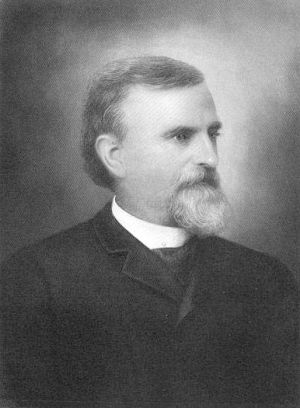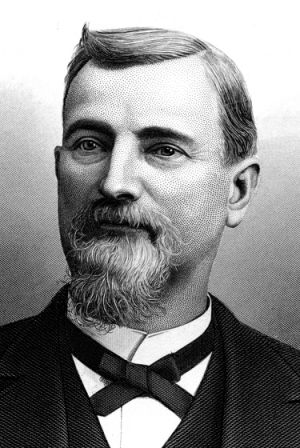Benjamin Roden: Difference between revisions
mNo edit summary |
No edit summary |
||
| (4 intermediate revisions by the same user not shown) | |||
| Line 1: | Line 1: | ||
[[Image:Benjamin Roden 1887.jpg|right|thumb|Benjamin Roden in 1887]] | [[Image:Benjamin Roden 1887.jpg|right|thumb|Benjamin Roden in 1887]] | ||
[[Image:Benjamin Roden.jpg|right|thumb|Roden in 1920. {{BPL permission caption| | [[Image:Benjamin Roden.jpg|right|thumb|Roden in 1920. {{BPL permission caption|https://cdm16044.contentdm.oclc.org/digital/collection/p4017coll6/id/261/rec/7}}]] | ||
'''Benjamin Franklin Roden''' (born [[January 5]], [[1844]] in DeKalb County | '''Benjamin Franklin Roden''' (born [[January 5]], [[1844]] in DeKalb County; died [[February 23]], [[1908]] in [[Birmingham]]) founded numerous businesses in the early days of Birmingham. | ||
Roden was the son of | Roden was the son of [[William Roden|William]] and [[Viola Roden]], grandson of [[John B. Roden (soldier)|John B. Roden]] and great-grandson of Revolutionary War orderly sergeant Jeremiah Roden. He grew up on his family's farm until [[1861]], when he volunteered with the [[27th Alabama Infantry, CSA|27th Alabama Infantry]] for service to Polk's Army in the [[Civil War]]. He was wounded by a musket ball to the knee at the Battle of Shiloh in April [[1862]] and was assigned to the quartermaster corps before becoming a surgeon's assistant. | ||
After the war, Roden continued his schooling at McKenzie College in Clarksville, Texas and spent some time as a teacher among the Choctaw people. After repaying money he had borrowed from the founder of his college he entered the grocery and timber business in Gadsden, trading as Latham & Roden. | After the war, Roden continued his schooling at McKenzie College in Clarksville, Texas and spent some time as a teacher among the Choctaw people. After repaying money he had borrowed from the founder of his college he entered the grocery and timber business in Gadsden, trading as Latham & Roden. | ||
At the invitation of [[James Powell]], Roden moved to Birmingham in [[1871]] and became one of its busiest entrepreneurs. He expanded his [[B. F. Roden Grocery Company]] into a wholesale distributor, founded the [[Avondale Land Company]], helped found the [[Birmingham Street Railway Company]] and the [[Bimingham Chain Works]], and served as a director for the [[Birmingham Gas and Electric Light Company]], the [[Birmingham National Bank]], and the [[Alabama National Bank]]. He served as president of the [[Central Coal Company]] and the [[Birmingham Insurance Company]] and also | At the invitation of [[James Powell]], Roden moved to Birmingham in [[1871]] and became one of its busiest entrepreneurs. He operated the [[St Elmo Saloon]] on [[20th Street North|20th Street]] in the early 1870s, expanded his [[B. F. Roden Grocery Company]] into a wholesale distributor, founded the [[Avondale Land Company]], helped found the [[Birmingham Street Railway Company]] and the [[Bimingham Chain Works]], and served as a director for the [[Birmingham Gas and Electric Light Company]], the [[Birmingham National Bank]], and the [[Alabama National Bank]]. He served as president of the [[Central Coal Company]] and the [[Birmingham Insurance Company]] and also financed the construction of the [[Roden Block]] in the 1880s and the never-completed [[Roden Hotel]] in the 1900s. His brother, [[John B. Roden]], operated a book store in Birmingham. | ||
Roden also served in the first [[Birmingham Board of Aldermen]] and was responsible for the construction of the city's first [[streetcar]] system. He married Ella Lee Didlake of Perry County in [[1872]] and they had five children, Viola, Florence, Lillian, [[Benjamin Roden | Roden also served in the first [[Birmingham Board of Aldermen]] and was responsible for the construction of the city's first [[streetcar]] system. He married Ella Lee Didlake of Perry County in [[1872]] and they had five children, [[Viola Redin|Viola]], [[Florence Davis|Florence]], [[Lillian Bowron|Lillian]], [[Benjamin Roden Jr|Benjamin Jr]] and [[Maibelle Beatty|Maibelle]]. | ||
Roden died in [[1908]] and is buried at [[Elmwood Cemetery]]. | |||
==References== | ==References== | ||
* {{Dubose-1887}} | * {{Dubose-1887}} | ||
* {{Cruikshank-1920}} | * {{Cruikshank-1920}} | ||
==External links== | |||
* [https://www.findagrave.com/memorial/76044630/benjamin-franklin-roden Benjamin Franklin Roden] at Findagrave.com | |||
{{DEFAULTSORT:Roden, Benjamin}} | {{DEFAULTSORT:Roden, Benjamin}} | ||
| Line 23: | Line 28: | ||
[[Category:Developers]] | [[Category:Developers]] | ||
[[Category:Birmingham Board of Aldermen]] | [[Category:Birmingham Board of Aldermen]] | ||
[[Category:Elmwood burials]] | |||
Latest revision as of 13:09, 4 January 2021

Benjamin Franklin Roden (born January 5, 1844 in DeKalb County; died February 23, 1908 in Birmingham) founded numerous businesses in the early days of Birmingham.
Roden was the son of William and Viola Roden, grandson of John B. Roden and great-grandson of Revolutionary War orderly sergeant Jeremiah Roden. He grew up on his family's farm until 1861, when he volunteered with the 27th Alabama Infantry for service to Polk's Army in the Civil War. He was wounded by a musket ball to the knee at the Battle of Shiloh in April 1862 and was assigned to the quartermaster corps before becoming a surgeon's assistant.
After the war, Roden continued his schooling at McKenzie College in Clarksville, Texas and spent some time as a teacher among the Choctaw people. After repaying money he had borrowed from the founder of his college he entered the grocery and timber business in Gadsden, trading as Latham & Roden.
At the invitation of James Powell, Roden moved to Birmingham in 1871 and became one of its busiest entrepreneurs. He operated the St Elmo Saloon on 20th Street in the early 1870s, expanded his B. F. Roden Grocery Company into a wholesale distributor, founded the Avondale Land Company, helped found the Birmingham Street Railway Company and the Bimingham Chain Works, and served as a director for the Birmingham Gas and Electric Light Company, the Birmingham National Bank, and the Alabama National Bank. He served as president of the Central Coal Company and the Birmingham Insurance Company and also financed the construction of the Roden Block in the 1880s and the never-completed Roden Hotel in the 1900s. His brother, John B. Roden, operated a book store in Birmingham.
Roden also served in the first Birmingham Board of Aldermen and was responsible for the construction of the city's first streetcar system. He married Ella Lee Didlake of Perry County in 1872 and they had five children, Viola, Florence, Lillian, Benjamin Jr and Maibelle.
Roden died in 1908 and is buried at Elmwood Cemetery.
References
- Dubose, John Witherspoon (1887) Jefferson County and Birmingham, Alabama: Historical and Biographical Birmingham: Teeple & Smith, Publishers; Caldwell Printing Works.
- Cruikshank, George H. (1920) History of Birmingham and Its Environs: A Narrative Account of Their Historical Progress, Their People, and Their Principal Interests 2 volumes. Chicago, Illinois: Lewis Publishing Company. - via Birmingham Public Library Digital Collections
External links
- Benjamin Franklin Roden at Findagrave.com
